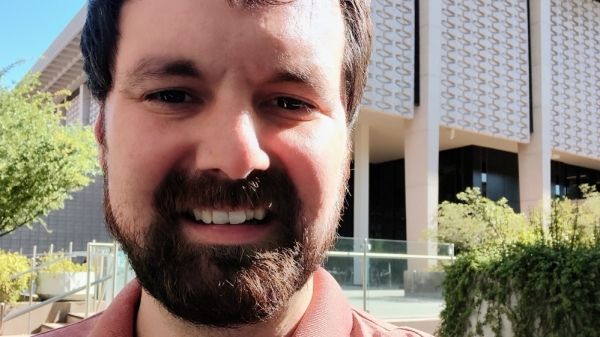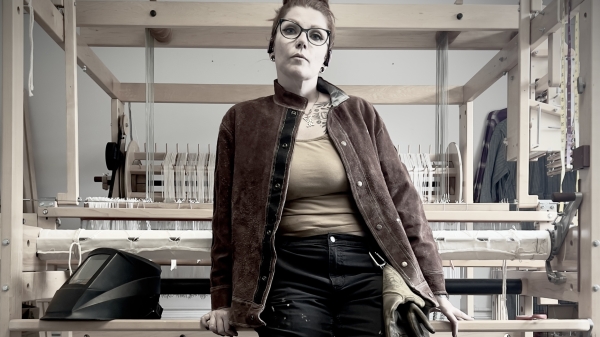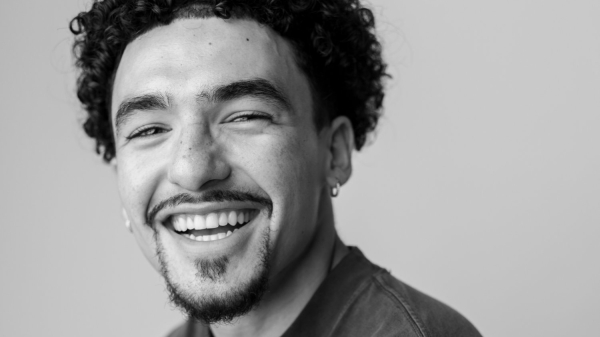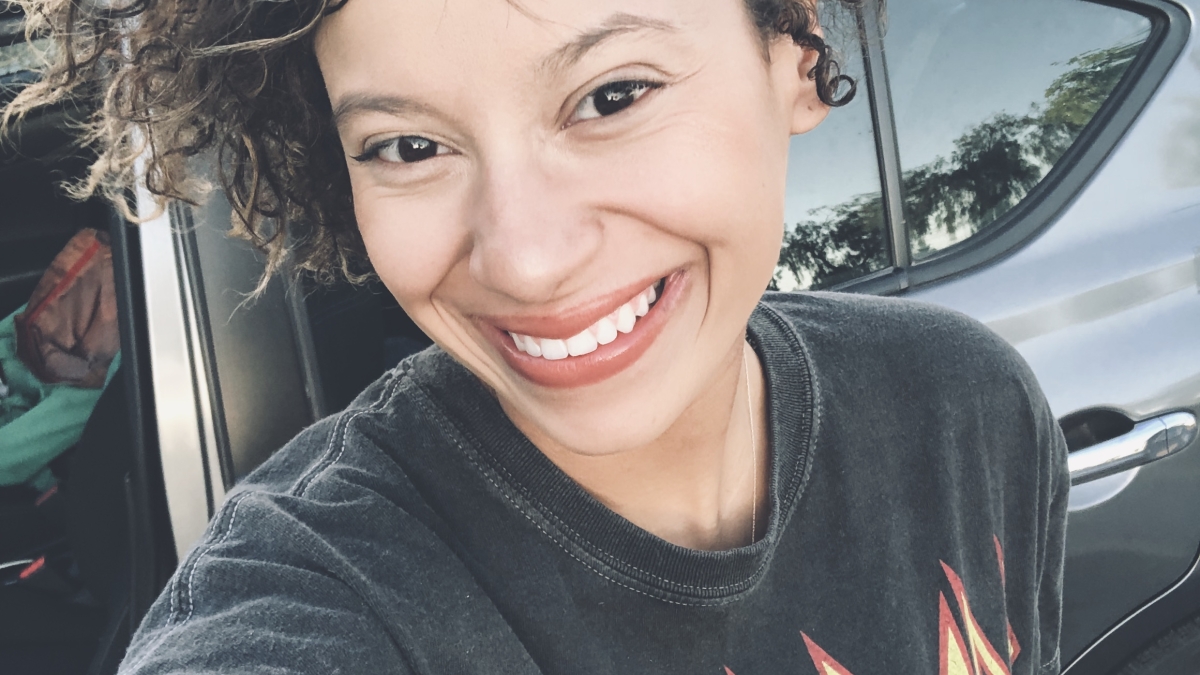Editor’s note: This is part of a series of profiles for spring 2019 commencement.
Bachelor of Arts in innovation in society graduate Jaideen Cobb is using her education on futures thinking, her flair for design and, most importantly, her inherent desire to catalyze positive change in prototyping technology with the human experience in mind.
Taking advantage of the wealth of resources at the Fabrication Lab at the Herberger Institute's School of Arts, Media and Engineering, Cobb has invested countless hours into developing prototypes that have the potential to significantly impact interpersonal communication and human interactions for some individuals.
Perhaps her most significant project is a therapy robot that allows an individual to communicate, via touch, the location and intensity of pain they are experiencing. It could be used with nonverbal individuals or those who have experienced trauma and have a difficult time talking about it with others.
“Say you’re a medical professional, and you want to ask this person a question about where they feel most heavy in their physical body, or in their spirit or mind,” Cobb explained. “It can be hard to diagnose someone who feels uncomfortable verbalizing how they feel. With this device I’m developing, the patient would be able to do something like press the robot’s head to indicate that their mental health isn’t OK.”
Cobb described how an LED light would indicate the magnitude of a sensation by its brightness when a person applies pressure to the robot’s form. A dim light would indicate weak sensation, and brighter lights would reflect more intense feelings.
She is also working with a team of two other students in her program to develop a smart garden system that would make fresh fruits and vegetables more available to underserved populations, such as those in food deserts. The countertop-sized garden allows precision control of plant environments, making indoor gardens viable for people without access to outdoor resources.
On top of all of this, Cobb found time to start a nonprofit organization called The Involvement Project, which she describes as “a mental health movement that inspires the next generation of thought leaders.” She hopes to scale up the organization in the near future.
Question: What was your “aha” moment, when you realized you wanted to study the field you majored in?
Answer: Originally I had an interest in writing, so I started out pursuing that. During that time, I had an internship where my “beat” was covering stories on local businesses. Some of these were small engineering businesses and local startups that were popping up throughout the Valley. I got really inspired by the conversations I was having in these interviews and thinking, “Holy cow, these people are doing great things that they believe can change the world.” And I remember thinking that was something I really wanted to do, so I started reconsidering my journey. I have always been interested in design, but I wanted it to have a social element. I was looking for something that would allow me the flexibility to get a handle on a variety of different concepts. On the ASU website there’s this little tab that said "cool majors," and I remember clicking on it and reading about the future of innovation in society degree. I was drawn to the theme of "the future is for everyone" because it aligned so closely to my personal values and the things I wanted to do in life. It was talking about all of the potential careers in policy, education, etc. And I knew that I wanted to dip my toe into some of that. I’m definitely an innovator. I want to reconstruct the way that we look at our social systems and technological systems and cross-examine them, so it appealed to me.
Q: What’s something you learned while at ASU — in the classroom or otherwise — that surprised you, that changed your perspective?
A: I really embraced the idea that anybody can create a future after coming to ASU. A lot of famous innovators have said things along those lines, but I didn’t fully realize what it meant to me personally until entering this program and after learning from my peers and professors. I began to feel inspired and equipped with the kind of knowledge I needed to take all of these skills and use them to make a difference. Before this, I thought I had ambition, I thought I had passion, and I thought I had talent, but I didn’t really know how far that would take me. After being surrounded by people who believed in me, I realized I do have what it takes to be the one to really make things happen, to push a vision forward that can benefit a lot of people.
Q: Why did you choose ASU?
A: Ever since I was in high school, I kind of always knew I was destined to be a Sun Devil. My sister went to the U of A for some time, and because she is older and one step ahead of me, my parents would always say, "Oh you’ll go to the U of A with your sister." But I always knew that I wanted to go to ASU. There was just something that felt good about being on campus here. I went on one of those tours in high school and looking around, everyone seemed so happy, and everything just felt right. I just knew.
Q: Which professor taught you the most important lesson while at ASU?
A: Professor Gregg Zachary. When I was in his class, I was doing the readings, I was nodding my head in class, I was engaging when I could, but there were times when he would call me out in class and ask me if I had something to say. And I remember always having something to say, but sometimes I wouldn’t want to verbalize it because I felt so nervous. I remember one day I met with him in his office hours to discuss some of the content from class because I found it interesting. While I was there, he told me he needed to hear my voice more in class. That was a really powerful lesson for me because I’m not used to someone asking me to speak my mind, and especially not someone assuming that I have something to say and working to draw it out of me. Ever since he asked me to speak up, I haven’t been quiet because I was able to find my voice. Having someone tell you that they know you have something to say, not only in the classroom but to the world, meant a lot.
Another person that comes to mind is Professor Lauren Withycombe-Keeler. One thing that she really inspired me with was the idea of resilience. When I was working with her as a research fellow two semesters ago, I was able to learn that when you want to see things happen, no matter what goes wrong, just stick with it, be resilient and persevere, and you’ll see results.
Q: What’s the best piece of advice you’d give to those still in school?
A: Give it your all. You’re going to be tired, you’re going to doubt whether or not you’ll make it through the week. Balancing being a student with having a life, working, getting an internship — it’s hard. But give it everything you’ve got regardless. Read every single thing your professors give you because the content that they share will empower you to make better decisions moving forward in your life. I was able to really grow as a person because of the tools they’ve given me, and if I could turn back time I wish I could have given even 120% or 130%! Whatever it is, give it 100% because it goes by so fast. When you’re first beginning something, it seems like an eternity. But when you’re ending it, it seems like only a day.
Q: What was your favorite spot on campus, whether for studying, meeting friends or just thinking about life?
A: There’s a secret garden on campus where I spent a ton of time. It’s crucial to take care of yourself and your mental health, and part of that is setting aside time to unwind. That spot was a great place to just sit and relax for me when I just needed to unplug and tuck my laptop away, maybe listen to some music out loud and just kind of look around.
That and the Fabrication Lab. One thing that I really like to do that gives me a lot of peace, is physical prototyping. There’s just something about putting something together with your hands.
Q: What are your plans after graduation?
A: A goal of mine is to become an expert in my field. I always knew that it wouldn’t be enough for me to work and be decent at what I do, because there’s always more research to be done and more things to discover. So my next step is to go to grad school in spring 2020 and study human-centered design so I can continue to explore different design practices in an interdisciplinary way to develop products and services that are going to be better for the world.
Q: If someone gave you $40 million to solve one problem on our planet, what would you tackle?
A: Recently I started a small nonprofit called The Involvement Project with the goal of destigmatizing mental health issues. The Involvement Project is a modern mental health movement that engages youth and young people ages 15–30 around mental health challenges and stigmas with digital art and community gatherings, with a central mission to provide resources for mental health education, advocacy, prevention, self-love and awareness. I’d like to expand it to a global scale and be able to turn it into an international campaign. Or I’d build a lab where community members can come and learn how to build and fabricate robust technology so that they can have a hand in designing the future.
By Madelyn Nelson
More Sun Devil community

ASU linguist is outstanding humanities grad
Editor’s note: This story is part of a series of profiles of notable spring 2024 graduates. You can take a guy out of the South…

Art history graduate student: ‘Here at ASU, I learned just how capable I am’
Editor’s note: This story is part of a series of profiles of notable spring 2024 graduates. Sarah “Gigi” Brazeal never thought…

Journalism grad merges photojournalism with sustainability, design
By Lauren Boykins Editor’s note: This story is part of a series of profiles of notable spring 2024 graduates. Donovan Johnson…
